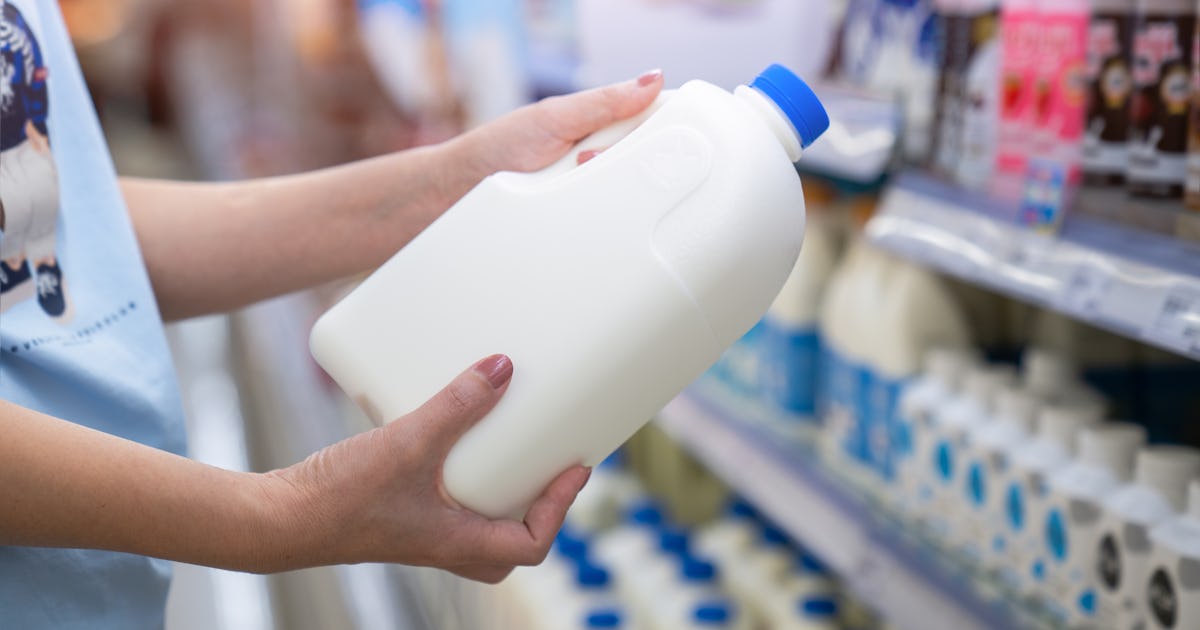
It’s been a few weeks since the FDA suspended milk dairy quality testing after suffering sweeping staff cuts at the hands of DOGE. As Scary Mommy previously reported, milk testing by the FDA screens milk products for “a number of safety concerns, including drug residues (such as antibiotics), pathogens (such as salmonella), and viruses (such as bird flu).” The tests ensure that pasteurization has effectively killed off any viruses and that the composition of the milk is still good. So, with that step removed, is it OK to drink milk right now? We asked infectious disease specialists whether suspending this final quality check in milk’s journey from farm to store is worth switching to almond milk.
Is it OK to drink milk right now?
In short, yes — experts do not think the public needs to avoid store-bought milk and dairy products.
“Milk products in the store are pasteurized, and that’s all forms of milk: Whole milk, skim milk, 2% milk, cheeses, yogurts, and those things are all pasteurized. We use them in my family, and I have milk in my coffee right here at my desk at the present time. I think we can have complete confidence in pasteurized milk and dairy products,” says Dr. William Schaffner, professor of infectious diseases at Vanderbilt University Medical Center.
Schaffner suggests that if you’re nervous about this extra safety step being suspended, you might opt not to eat unpasteurized cheeses until it is reinstated. Many soft cheeses are unpasteurized, like soft, feta, goat cheese, brie, Camembert, blue-veined cheeses, and queso fresco, according to Nemours Health. Soft cheeses labeled “pasteurized” usually are OK, especially if they’re individually packaged and not cut at the deli counter from a larger piece. You can sometimes find pasteurized versions of them in stores; the label will specify.
“That’s where a potential hazard is, not just for bird flu but for many other infections,” he explains. “There are regular outbreaks of a variety of infectious diseases in the United States related to unpasteurized milk and dairy products. No matter how careful the producers of those products are on the farm, you can’t eliminate the risk of infection entirely.”
Experts have always advised that people not drink raw milk, which is not pasteurized, and that advisory is even stronger now that viruses like bird flu are finding their way into dairy herds around the country.
OK, so can you get bird flu from drinking dairy milk?
Seeing headlines about the bird flu infecting dairy cattle at the same time as news about suspensions of milk quality testing is, uh, anxiety-inducing to say the least. Schaffner says the number of dairy cattle herds infected with bird flu has increased over time, which CDC data confirms. He also says infected cows do pass on the virus through their milk. That said, he sees no reason to worry if you are drinking pasteurized milk.
“Fortunately, should there be H5N1 viruses in the milk, pasteurization kills all,” he says.
However, some experts still say suspending milk testing is a very bad idea right now. “Bird flu also remains a serious public health concern. Pulling back on surveillance only heightens the risk, especially for rural communities and those with close contact to livestock. This is not the time to take our foot off the gas when it comes to monitoring threats,” says Dr. Tyler B. Evans, CEO and co-founder of the Wellness and Equity Alliance and author of Pandemics, Poverty, and Politics.
What the milk testing suspension means for families
If you’ve been drinking milk and eating cheese from your grocery store, you probably don’t need to alter your habits as a result of these changes at the FDA, experts say. However, it does concern them to see the Trump administration eroding “foundational public health protections.”
“It is deeply concerning that the USDA and FDA are no longer testing the milk supply. Pasteurization, sanitation, and routine quality control in dairy production have long been pillars of U.S. food safety — among the most robust in the world. Without systematic testing, we increase the risk of exposure to pathogens like E. coli, salmonella, listeria, and campylobacter,” Evans says.
Evans references the staffing cuts across key health organizations throughout our government, from FDA food scientists to vaccine researchers, calling this “a troubling trend of disinvestment in the very systems that keep Americans safe.” He says these events are a reminder that public health outcomes “are shaped as much by political and social decisions” as the actual viruses in our food supply, or our personal decisions about what to buy at the grocery store.
If you are someone who wants to cut out soft cheeses right now, that’s OK. Evans does encourage consumers to stay up to date on any alerts from their local health departments about food safety, and remember that you can always ask your primary care providers for up-to-date information on local outbreaks.
“It’s unfortunate that the burden is increasingly shifting to individuals as public health infrastructure is being dismantled. Still, your local health department is one of the best resources we have left,” he says.





